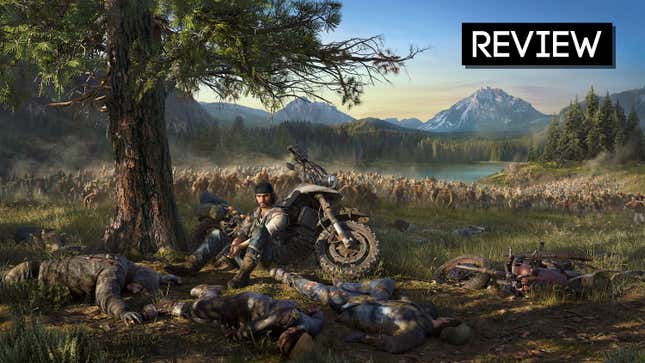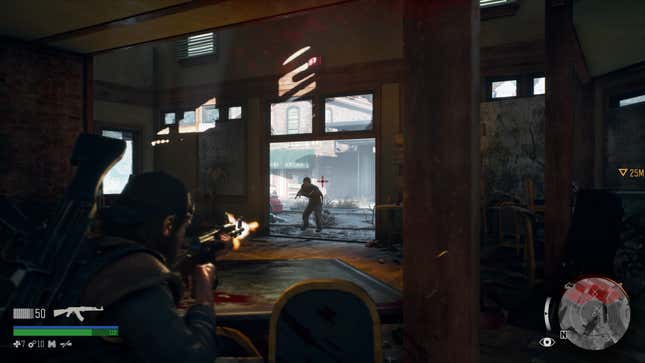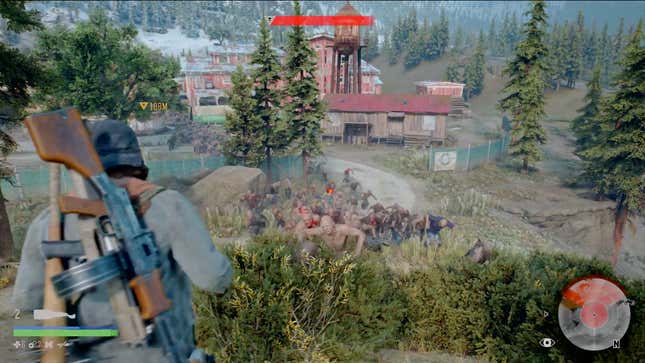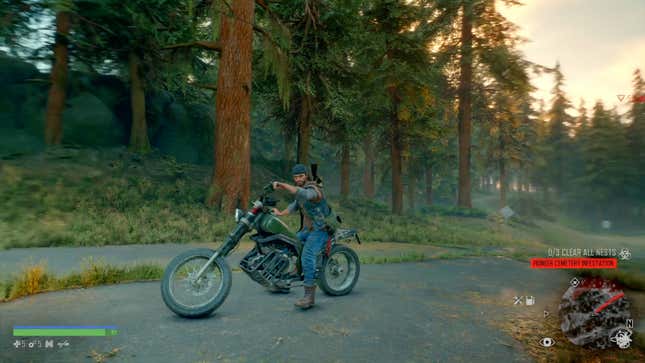
It’s worthwhile to think about the number of people around you who are waiting for the world to end. There are people who must do it for a living: government employees who specialize in disaster relief and crisis response, civil engineers, military personnel—people who must imagine the end to make sure it never comes. But there are others: Fundamentalist evangelicals waiting for a rapture. Libertarian preppers who shun government and pride themselves on self-sufficiency. Conspiracy theorists and internet nihilists. Anyone remotely concerned with the future of the planet.
For most people, this is optional. You choose to be someone who thinks about the end, and that choice colors your attitude in the present, for good or ill. In video games, however, the doom of civilization is old hat. It’s so familiar that we’ve moved past it, affixing a genre name to what comes after: The post-apocalypse, where we find games like the new single player PlayStation 4 exclusive Days Gone.
Post-apocalyptic stories are an easy mark for video games to hit, precisely because they justify all sorts of behavior that’s hard to deal with in any other setting. For developers interested in rooting video games in believable narratives, they’re liberating. They provide a context in which violent people with sticky fingers seem pretty reasonable. The trouble, then, comes when a game tells a story within this familiar context, and ultimately finds itself trapped by its tropes. Days Gone displays little that reaches beyond its many influences and contemporaries, instead settling for being a hollow simulacrum of them all.
***
In Days Gone you play as a man named Deacon St. John. He survives in the forests of rural Oregon after the end of the world, when hordes of rabid, zombie-like monsters called Freakers overran everything, bringing about society’s collapse. Deacon’s past life as a member of the Mongrels MC biker gang makes him ideally suited to life in The Shit, as they call it, and also ideally suited to being a video game protagonist. He has a motorcycle he rides, cares for, and improves. He’s proficient with firearms, and has zero qualms about using them. He has a sympathetic past, where he is separated from his wife at the end of everything, and presumes her dead. And he has a code, one that mostly just involves rage at anyone who dares point a gun at an unarmed woman.
There isn’t much to Deacon that doesn’t seem like it’s there for the purpose of making a video game, and a very specific kind of video game at that. You know what kind of game, because you’ve likely played it more than once: A third-person action game with guns for shooting and cudgels for swinging and recipes for crafting weapons. A game where you scrounge for vague resources like “scrap” and “rags,” encounter different factions of humans that want you dead, and various phenotypes of Freaker to be wary of, and between all of them, endless corpses to loot. And, of course, there are experience points and skill trees with abilities to unlock.
These systems are all standard-issue, part of the industrial hum of big-budget video games. They’re like a laugh track in a sitcom—standard operating procedure for a work of mass appeal, even if it signals creative complacency. Including them is fine, but it puts more pressure on the other aspects of a game to elevate the whole.
There’s not much you can point to in Days Gone if you were looking for a calling card, a signature feature that makes it distinctive. The easiest place to look for this is in the motorcycle that you, as Deacon, spend the game using. It can be upgraded, though there are only about a handful of upgrades for every major part, improving things such as speed, traction, damage resistance, and fuel tank size. The cosmetic improvements are more plentiful, but also limited—you can only paint so much of the bike’s frame, or apply a unique skin wholesale. You don’t spec the bike out to handle different situations. It is improved as a matter of course, when the game makes new parts available to you and a faster, hardier bike would come in handy.
Since Days Gone requires you to be near your bike to save or fast travel, and because you need enough gas in the tank in order to make the trip, you must be responsible with fuel management. You also should stop and make repairs whenever your bike takes too much damage. There’s the implication that your potential interactions with your motorcycle might make for something meaningful and distinct, a bike that’s yours in a way that extends beyond a paint job and a cool headlamp. Instead, the game treats the motorcycle the way other games treat horses. It’s your ride. It gets the job done in such a strictly efficient way you might altogether forget that motorcycles are, in fact, awesome.
***
The glut of post-apocalyptic fiction in pop culture at large and video games in particular has led to a set of beliefs and tropes that have settled into the bones of these stories: A moral nihilism that posits compassion as weakness, that the ends justify the means, that there is a thin line protecting us from them and it extends directly from the barrel of a gun. In the post-apocalypse, we hold these truths to be self-evident, to challenge them is to rail against gravity.

Days Gone almost dares to grapple with this, to argue that maybe there’s virtue in pushing against the mean math of survival that we’ve come to accept as necessary and obvious, something more to the preservation of society than guns in the hands of people who believe in order and rule of law. It puts these notions in the mouths of characters who argue with Deacon, a drifter for whom getting by is the only thing that matters.
Toward the end of the game’s first act, you meet the most prominent voice that pushes against Deacon’s drifter philosophy: Iron Mike, a man who’s forged a treaty with the most hostile human enemies in the game and believes in the sanctity of life for all, even the monstrous. “Caring will get you killed,” Deacon tells him, believing Iron Mike to be a fool. “Not caring will get you killed just as easy,” he replies.
Instead of having Deacon wrestle with these ideas and giving players meaningful ways of engaging with them, the game instead introduces a series of antagonists unquestionably worse than the existential threat of the Freaker hordes and Deacon’s ambiguous morality, villains who force everyone to put these debates aside, or even yield to survival tropes and their tired absolutes. It sidelines any sense of self-examination its narrative might lead to, and buries it further by wrapping it all up in a story of love, brotherhood, and a drifter learning to call a place home again. It’s a saccharine frame that attempts to paper over messy, incoherent themes with sentiment, only to draw more attention to them.
***
Playing Days Gone is a lot like playing most other games of its stature. You will visit camps populated by merchants to buy gear from and characters to talk to. Those characters will send you out on jobs, usually involving finding something or someone or killing something or someone. They’re all solid, with the exception of frequent, bafflingly bad stealth missions where you must spy on government researchers, staying close enough to eavesdrop while avoiding their armed escorts. Stealth in Days Gone is basic to the point of hilarity—crouch in a bush up to Deacon’s neck and every character will treat you as invisible—but these missions frustrate by making guards invincible, and by arbitrarily restricting you from using rocks to distract them. Get spotted once, and you have to restart them.
Barring that low, most of the game’s main and side missions hold steady. The best missions are the mostly optional freaker hordes. Hordes are the most technically impressive thing in Days Gone, massive, frightening swarms of freakers that seem to number in the hundreds. (It’s impossible to count them but you can guess by the number of bounties they leave behind for you to collect—one horde left me with over 200.) Freaker hordes require planning to take out, and will overrun you if all you do is square up with a really big gun. They also have a way of wandering into places you need to be for other missions, and have the nice effect of being the one genuinely chilling, panic-inducing thing in a game that’s about a zombie apocalypse. Taking on a horde is thrilling and fun in a way that makes everything else feel mundane.

There are a few thoughtful touches in its design that suggest Days Gone’s developers have sympathy for the player of large big-budget games. Instead of a standard quest log, Days Gone tracks your progress through various “storylines.” A few, like the storyline that tasks you with the optional task of clearing out Freaker nests you find in the world, are glorified to-do lists. Most, however, are a genuine attempt to keep track of how every mission advances each subplot and character arc, doubling as a good way to remind yourself of story beats after time away. All of them clearly denote your rewards for completing each mission and do a lot to help you prioritize what’s worthwhile in a given session and what’s best saved for later, or skipped entirely.
On the other hand, there are times where Days Gone seems to be barely holding it together, with frequent bugs that run the gamut from amusing to frustrating. A puddle on a bridge somehow became an ocean, swallowing me and drowning me in the river beneath. The frame rate stuttered and occasionally froze outright for a few seconds. And the audio was generally a mess, with gunfire occasionally going silent, my motorcycle engine revving while idle, and dialogue coming in at volumes that make it hard to determine who is talking: too low for parts of long motorcycle rides, or too loud in comparison to the sound of the engine that suddenly dipped for no reason.
Through it all, the game remained playable and only crashed once on my Playstation 4 Pro, late in my 30-hour playthrough, corrupting a save file I had created just before things went haywire. Fortunately, Days Gone is generous with autosaves, and I never felt in danger of losing a lot of progress.
Despite its substantial bugginess, there’s an efficiency to the design of Days Gone. It’s very easy to keep playing, unoriginal as much of it is.
***

But we were talking about the end of the world.
A possible explanation for video games’ love affair with the oxymoron of the post-apocalypse is that it is reductive: Doomsday means the end of most everything, and that means we can wipe away all the complicated and contradictory and messy rules and feelings that come with humanity and in their stead, replace them with something more primal. Have you survived or not? It’s a simple binary, and as elaborate systems run by computers, video games are very good at handling binaries.
The problem comes when video games rig the score. Days Gone is a third-person action game with a layer of survival baked in. It’s about shooting things and foraging for useful equipment to better your chances at staying alive in an increasingly hostile environment. Those are expressed through play, and even when said play is derivative as Days Gone is, it can still be compelling.
Deciding what that means through narrative is something else altogether, and where the tropes of the post-apocalypse become most grating. In Days Gone, Deacon St. John has done horrible things, and so has everyone else. Deacon and his cohorts would like things to not be this way, but they are, and them’s the breaks. And it is tiresome. It is exhausting to watch another gruff white dude experience the extremes of humanity brought about by disaster, to be torn between pure, reliable self-interest and the fragile strength of community, as if those are the only two ways to be. It’s dumping water into the ocean, failing to offer anything new in favor of blending formlessly into arguments made by 10 years of The Walking Dead and countless post-apocalyptic games of its ilk. Look no further than the game developers calling the zombies “freakers,” and expecting us to take that as something new.